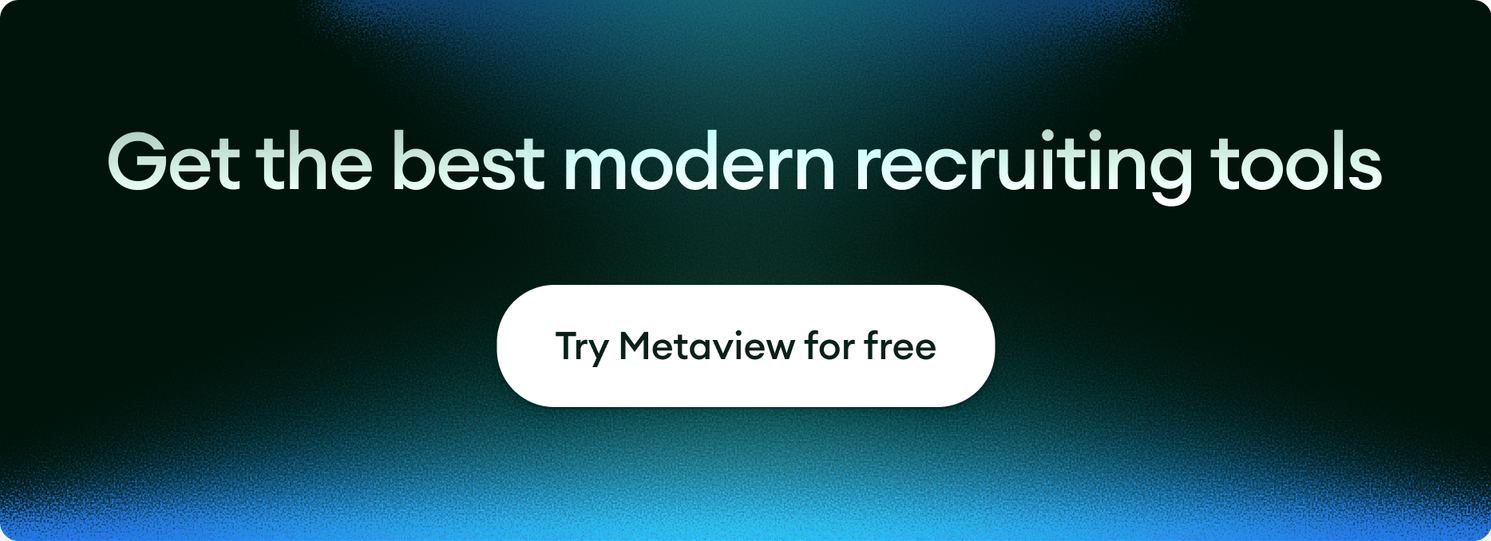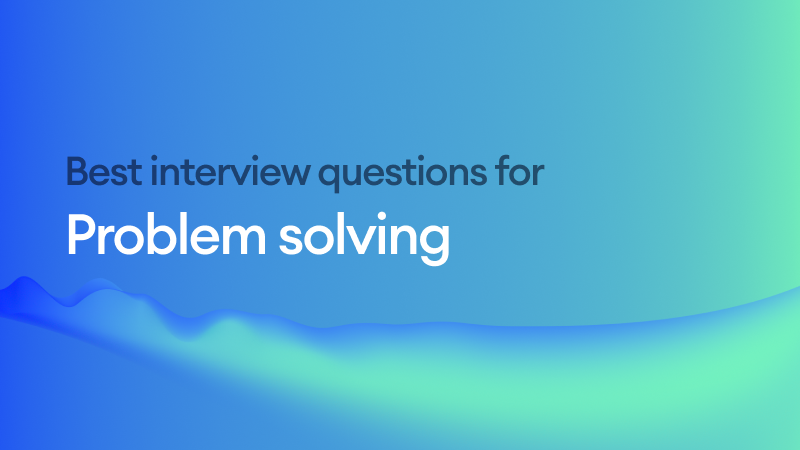No matter the role, industry, or level of seniority, problem-solving is one of the most reliable predictors of on-the-job success. Great problem solvers navigate ambiguity, break down complex issues, and make thoughtful decisions—all qualities that directly impact team performance and business outcomes.
The right interview questions give you a window into how candidates think, how they approach challenges, and how effectively they learn from mistakes. With a thoughtful, well-structured approach, you can uncover these abilities long before a candidate encounters their first real challenge on the job.
Use this curated list of problem-solving interview questions to identify candidates who deliver clarity, creativity, and impact when it matters most.
Key takeaways:
- Problem-solving essentials: Assess candidates’ ability to analyze problems, create action plans, and evaluate outcomes, focusing on their thought process and practical solutions.
- Creativity and adaptability: Evaluate responses for innovation, flexibility under pressure, and resourceful use of limited tools or information.
- Results-driven approach: Seek candidates who measure the success of their solutions, balance short-term and long-term outcomes, and prioritize meaningful impact over box-ticking.
What are problem-solving skills?
Problem-solving skills are the abilities employees use to understand challenges, evaluate potential solutions, and take effective action to resolve issues. They combine analytical thinking, creativity, decision making, and the capacity to break complex situations into manageable parts.
Strong problem solvers also demonstrate adaptability. They can adjust their approach as new information emerges or conditions change. These skills aren’t limited to technical roles; they’re essential across every function because every job involves navigating obstacles and making thoughtful choices.
Ultimately, problem-solving skills reveal how someone approaches uncertainty and drives outcomes, making them a core competency to evaluate during interviews.
Unlocking a candidate's problem-solving abilities
By probing a candidate's problem-solving skills, you'll get a more thorough understanding of their approach, thought process, and skill in solving challenges and having impact in the workplace.
With problem solving interview questions, the objective is to get a better sense for how a candidate:
- Identifies and analyzes problems
- Creates action plans
- Implements solutions
- Evaluates results
- Takes lessons forward for the future
Dig into specific examples of candidates' problem solving process in real-world scenarios, and test how they would deal with hypothetical problems that might arise in your company.
Problem-solving interview questions
Here’s a comprehensive list of the questions to help you assess problem solving.
- Describe a time when you solved a problem without input from someone more senior to you.
- How do you decide when to handle a problem independently or seek help?
- Tell me about a time when you preemptively addressed a complex problem before it escalated.
- If faced with two urgent tasks simultaneously, how would you prioritize them?
- Describe a time when you developed an innovative solution with limited resources or information.
- Describe a time when you had to develop a solution for a problem when you had limited resources or information.
- Tell me about a situation where you came up with a creative solution to a problem.
- Walk me through an experience of tackling a daunting project.
- Tell me about a time when you had to change your strategy last minute.
- Describe a time when you faced significant obstacles to solving a problem.
- Can you give me examples of metrics you use to measure the success of your problem-solving efforts?
- How do you decide when a problem is "solved"?
- Can you tell me about a time when you've solved a problem that required making tradeoffs between short and long-term outcomes?
Now let’s look at these with the specific goals and context around which you might ask them.
General problem-solving & decision-making skills interview questions
Problem solving goes hand in hand with sound decision making. Identifying candidates who can independently tackle issues and make well-reasoned decisions is crucial.
Here are some interview questions to explore how candidates approach their decision-making process in solving problems:
- Describe a time when you solved a problem without input from someone more senior to you.
- How do you decide when to handle a problem independently or seek help?
- Tell me about a time when you preemptively addressed a complex problem before it escalated.
- If faced with two urgent tasks simultaneously, how would you prioritize them?
What to look for in responses
These interview questions assess how job candidates use critical thinking and initiative to tackle problems. Do they wait for others to tell them when to fix something, or do they proactively find opportunities to make improvements?
Look for answers demonstrating an analytical approach to the prioritization and execution of problem solving. Make sure you dig into the candidate's thought process behind how they assess tradeoffs, and think about the impact of potential solutions.
Interview questions to assess creativity in problem solving
Few problems can be solved without some degree of creativity. To get a sense for these skills in a candidate, dig into their past experiences with delivering original and out-of-the box solutions.
To gauge a candidate's creative problem-solving skills, consider these job interview questions:
- Describe a time when you had to develop a solution for a problem when you had limited resources or information.
- Tell me about a situation where you came up with a creative solution to a problem.
What to look for in responses
These questions uncover the candidate’s ability to think outside the box. If they struggle to come up with detailed answers, it's likely a sign they rely on tried and tested ways of doing things rather than searching for innovative solutions.
Look for answers that showcase originality, inventive use of resources, and the ability to deliver practical solutions under constraints.
As when testing most competencies, it's important to hear real-world examples of problem solving, rather than generic answers that don't reveal anything about how they approached complex situations in previous roles.
As always, look for answers that use the STAR (situation-task-action-result) method to effectively demonstrate how the candidate uses creativity to solve problems.
Problem-solving interview questions for adaptability and resourcefulness
The ability to adapt and be resourceful is essential in fast-paced work environments and is a key component of strong problem-solving capabilities.
Here are some interview questions you can use to assess these skills:
- Walk me through an experience of tackling a daunting project.
- Tell me about a time when you had to change your strategy last minute.
- Describe a time when you faced significant obstacles to solving a problem.
What to look for in responses
Responses to these questions should highlight the candidate’s flexibility and resourcefulness as demonstrated in previous experiences. Effective answers typically include examples of problem solving by adjusting strategies, on-their-feet thinking, and maintaining composure under pressure.
Get a clear understanding of whether a candidate can thrive in challenging situations. Do they break down in stressful situations, or do they maintain composure and find a way forward? Do you they know when to ask for help to maximize chances of success?
Results-oriented problem-solving interview questions
Execution is one thing, but strong problem solving skills must also include a focus on results, measurability, and long-term impact.
Here are some interview questions to assess how a candidate thinks about the results of their problem solving:
- Can you give me examples of metrics you use to measure the success of your problem-solving efforts?
- How do you decide when a problem is "solved"?
- Can you tell me about a time when you've solved a problem that required making tradeoffs between short and long-term outcomes?
What to look for in responses
You'll want to see that a candidate doesn't have a "box ticking" mentality, where they want to close out a problem just to check it off their list. Do they think critically about how to define and measure success, or do they take a binary problem solving approach? A candidate's problem-solving skills are only as good as their ability to understand the quality of their solutions and the tradeoffs of their impact.
Great candidates solve real problems, not just answer questions
Problem-solving skills are some of the strongest predictors of long-term performance — but only if you know how to assess them effectively. By using structured, thoughtful interview questions, you can uncover how candidates think, how they make decisions, and how they respond when things get challenging. These insights help you distinguish between candidates who talk about problem solving and those who can genuinely deliver it in real-world situations.
With the right approach, you’ll build teams that can navigate complexity, adapt quickly, and drive meaningful results. Use these questions as a foundation to evaluate problem-solving ability consistently and confidently across your hiring process.

FAQ
Why are problem-solving skills important in interviews?
Problem-solving skills reflect how a candidate handles complexity, ambiguity, and unexpected challenges, all of which directly impact job performance. Evaluating these skills helps you predict how someone will act in real situations, not just how they present themselves.
What types of questions reveal problem-solving ability?
Questions that require candidates to explain their process, describe real examples, analyze a scenario, or reason through trade-offs are most effective. Behavioral and situational questions tend to uncover the strongest signals.
How can I evaluate problem-solving answers objectively?
Use a structured rubric focused on clarity of thought, logical reasoning, creativity, decision quality, and impact. Avoid relying on gut feel. Instead, look for evidence-backed explanations.
Do problem-solving questions work for non-technical roles?
Yes. Every role involves challenges, decision-making, prioritization, and navigating ambiguity. Problem-solving assessments are relevant and valuable across functions and seniority levels.
How many problem-solving questions should I ask in an interview?
Most teams find 2–4 targeted questions are enough to uncover meaningful insights when paired with good follow-up prompts and active listening.


